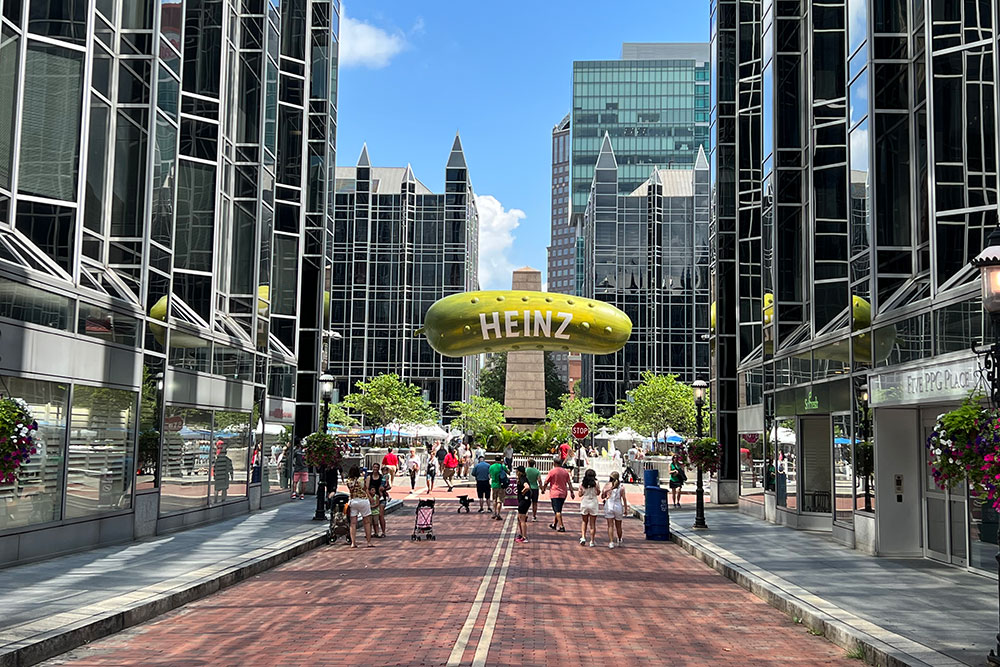Profile: The Pittsburgh Promoter, Dawn Keezer
For 30 years, Dawn Keezer has been selling the Steel City for movie and TV productions.
Dawn Keezer says she can sell just about any filmmaker on Pittsburgh. Whether you’re making a movie set in Paris, San Francisco or New York, the fast-talking executive director of the Pittsburgh Film Office has got you covered.
“We do New York better than New York does,” says Keezer. “Because here you can shut down one street and be in midtown Manhattan,” no massive traffic jam required.
She says it with such conviction that you get the sense she could win an argument against a hardcore Yankees fan.
There are a few exceptions to the ways Pittsburgh can twist itself to accommodate Hollywood. “We don’t do beaches or deserts,” she says. Then, Keezer, who jumps from subject to subject like a fast-paced action star, corrects herself — she and the film office helped create a desert in 2011 for the movie “Warrior” in the parking lot of the closed Century III Mall for an Iraqi war scene.
In her 30 years at the helm of the film office this month, she has brought together various parties so they can set up shop in Western Pennsylvania, making movies such as “It’s a Beautiful Day in the Neighborhood” and “The Perks of Being a Wallflower” and TV series such as “Mayor of Kingstown” and “The Chair.” There have been 172 productions attracted to the 10-county region since she arrived, she says, with an economic impact of $1.8 billion.
The biggest coup was attracting the 2012 blockbuster “The Dark Knight Rises,” turning Pittsburgh into Gotham City with a climatic digital explosion at Heinz Field, fictional home of the Gotham Rogues. It wouldn’t have happened without cooperation among Allegheny County and City officials, the Steelers, former Legendary Entertainment CEO Thomas Tull and others, she says.
Keezer speaks rapid-fire in a high-pitched voice that was once mistaken for a child’s when she did a radio ad. “I sound like Mickey Mouse. I own it.” But that voice belies an iron will.
“She’s a barracuda — and I mean that in the best possible way,” says Mamie Stein, president of IATSE Local 489, representing studio mechanics in southwestern Pennsylvania.
Adds Russ Streiner, founder and chair of the film office, “When she puts her mind to something, I pity the person on the other side of the table.”
One of Keezer’s proudest moments was closing down the Sixth Street Bridge (since renamed the Roberto Clemente Bridge) for 30 days in 1998 for Matthew Broderick’s epic fight scene in “Inspector Gadget.” Filming logistics also involved talking to organizers to reroute two parade routes when helicopter scenes were filmed over PPG Place.
Keezer didn’t grow up as a movie buff. She was an extroverted Air Force brat who made fast friends at each new school. Her family settled in Merced, California, when she started seventh grade. After graduating from the University of California-Berkeley with a degree in communications, she wanted to become the next Barbara Walters.
But she found out she was a natural salesperson by traveling around the country to sell television advertising to personal-injury attorneys. She was working as the director of tourism, public affairs and film for the city of Santa Cruz, California, when she got a life-changing call to head up the film office in Pittsburgh.
She arrived in Pittsburgh in 1994, an outspoken 29-year-old. It wasn’t always smooth sailing, mostly because there was a lack of understanding about how the industry works. “I had a president of a union who called me some horrible mean names … When people were mean to me, I was mean right back.”
When she moved back to California in 2006 and commuted to Pittsburgh every few weeks, critics were calling for her head, saying she didn’t bring enough movies in and accusing her of working from the beach.
Streiner believes that early resentment came because she was not from Pittsburgh. But he says she won over people with her energy and problem-solving skills. Success also helped, including a record 11 film and TV projects in 2021.
Keezer, who moved back to Pittsburgh full time in 2016, says most of her critics have left town. “I’m still here,” she says, flashing an impish smile. Now 59, she says she has mellowed with age, less apt to pop off at critics.
As the film industry recovers from the pandemic and writer’s strike, she is urging politicians to raise the annual $100 million tax credit to $300 million (the state failed to raise this cap in the 2024-25 budget) — an investment that would pay dividends. On average, she says, the film office brings in $150 million a year to the local economy.
The industry also has created jobs through Create PA, a workforce training program between the film office and Pittsburgh Public Theater that has trained 109 crew members. She hopes to move that program into the film office’s new $15 million tech-flex building that has been built on the site of the former Carrie Furnace in Rankin.
Keezer is always on her phone with Hollywood honchos, including a director who wants to shoot a biopic here. She won’t divulge the project, but her eyes widen as she says, “It’s big. It’s really, really big.”















